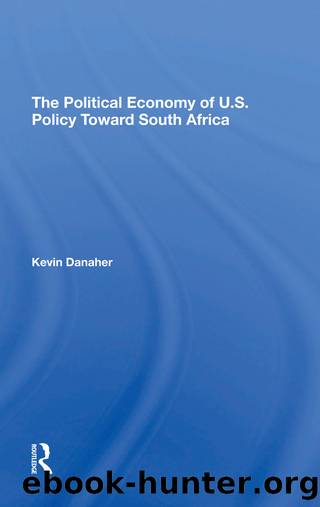The Political Economy of U.s. Policy Toward South Africa by Kevin Danaher

Author:Kevin Danaher [Danaher, Kevin]
Language: eng
Format: epub
Tags: History, Africa, General
ISBN: 9781000304572
Google: PEFQkOHm2UUC
Goodreads: 2796191
Publisher: Westview Press
Published: 1985-01-15T00:32:28+00:00
Redefining the U.S. Role
It was not until the Cubans intervened in Angola that Kissinger began seriously to question any of the assumptions about U.S. policy in the region. The ill-fated Angolan rescue operation was the immediate reaction, and the Kissinger speech in Lusaka in April 1976, outlining a new U.S. commitment to majority rule in Rhodesia, was the first serious step toward redefining the American role in southern Africa.50
The rapidity of change in Angola, and the eventual outcome, came as a shock to U.S. policymakers. Kissinger was determined that the method by which the MPLA had come to power, with the assistance of Cuban forces and massive Soviet aid, would not set a precedent for other revolutionaries in the region.51 Washington refused to recognize the MP LA government and blocked its entry into the United Nations. Kissinger's tough line against the Angolans was based mainly on their ties to the USSR and Cuba. But domestic pressures were also pushing the Ford administration to be loudly anticommunist.
It was no coincidence that the hardening of the Administration's line on Angola coincided with the conservative challenge mounted by Ronald Reagan during the primaries. Prom Florida in February to California in June, Ford (with considerable help from Kissinger) tried to appeal to the right wing of the Republican Party through caustic attacks on Cuba and Angola.52
Kissinger's denunciations of the Cuban role in Angola served several functions. In early 1976 South African troops were still in the process of withdrawing from Angola, and Kissinger's attacks on the Cubans helped deflect media attention from the South African retreat. Kissinger also had his eye on the next conflict that would require his attention: he threatened unspecified retaliation by the United States if Cuba Jbecame more directly involved in the Rhodesian conflict.53Kissinger "directed his threats about Zimbabwe almost exclusively against Cuba, although they apply by implication to the Soviet Union also".54 This unconventional twist to traditional anticommunist rhetoric was based on the fact that candidate Reagan had been blasting Kissinger's policy of detente with the Soviets. The Ford team hoped that by directing their anticommunist attacks primarily at Cuba they could still maintain an appearance of being tough on communism whileujiot playing into Reagan's hands on the issue of detente.55
With the war in Rhodesia intensifying, Kissinger was concerned to prevent an outcome similar to that in Angola.56 Kissinger explained his fears of radicalization in southern Africa in the following terms.
Events in Angola encouraged radicals to press for a military solution in Rhodesia. With radical influence on the rise, and with immense outside military strength apparently behind the radicals, even moderate and responsible African leaders-âfirm proponents of peaceful changeâ-began to conclude there was no alternative but to embrace the cause of violence.57
There were several long-term consequences of the guerrilla war that Kissinger was trying to avert. The Zimbabwean guerrillas stood a good chance of toppling Rhodesia's white minority, thus advancing the armed struggle to South Africa's doorstep. Prolonged people's war could result in a general radicalization of the populace,
Download
This site does not store any files on its server. We only index and link to content provided by other sites. Please contact the content providers to delete copyright contents if any and email us, we'll remove relevant links or contents immediately.
Man-made Catastrophes and Risk Information Concealment by Dmitry Chernov & Didier Sornette(6010)
The Revenge of Geography: What the Map Tells Us About Coming Conflicts and the Battle Against Fate by Kaplan Robert D(4076)
Zero Waste Home by Bea Johnson(3835)
COSMOS by Carl Sagan(3618)
Good by S. Walden(3549)
In a Sunburned Country by Bill Bryson(3537)
The Fate of Rome: Climate, Disease, and the End of an Empire (The Princeton History of the Ancient World) by Kyle Harper(3061)
A Wilder Time by William E. Glassley(2859)
Camino Island by John Grisham(2797)
Organic Mushroom Farming and Mycoremediation by Tradd Cotter(2689)
The Ogre by Doug Scott(2679)
Human Dynamics Research in Smart and Connected Communities by Shih-Lung Shaw & Daniel Sui(2500)
Energy Myths and Realities by Vaclav Smil(2488)
The Traveler's Gift by Andy Andrews(2458)
9781803241661-PYTHON FOR ARCGIS PRO by Unknown(2365)
Inside the Middle East by Avi Melamed(2352)
Birds of New Guinea by Pratt Thane K.; Beehler Bruce M.; Anderton John C(2254)
A History of Warfare by John Keegan(2240)
And the Band Played On by Randy Shilts(2200)
